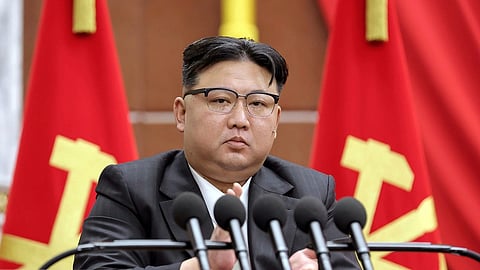

In a momentous departure from longstanding policies, North Korean leader Kim Jong Un has unequivocally declared that the prospect of reunification with South Korea is no longer on the table. This surprising shift in stance came as Kim addressed the Supreme People's Assembly, North Korea's rubber-stamp parliament.
The leader proposed constitutional amendments aimed at portraying South Korea as the "principal enemy" and emphasized the need to educate North Koreans accordingly.
Kim Jong Un's speech outlined a significant departure from previous commitments to the reunification of the Korean Peninsula. He called for amendments to the constitution to reflect the notion of "occupying," "recapturing," and "incorporating" South Korea into North Korean territory should a war break out on the peninsula.
This marks a departure from the cautious diplomatic language of previous years, revealing a more confrontational approach.
Moreover, Kim announced plans to dismantle three organizations tasked with reunification efforts, signaling a clear move away from engagement with the South.
These organizations, previously responsible for fostering dialogue and cooperation, will cease to exist as part of North Korea's new stance.
South Korean President Yoon Suk Yeol swiftly responded to Kim's statements, emphasizing a robust retaliation in the face of any provocations from the North.
President Yoon highlighted the overwhelming response capabilities of the South Korean military and pledged a multiple times stronger response to any hostile actions.
The strained relations between North and South Korea have witnessed a notable deterioration in recent months.
In November, North Korea fully suspended a five-year military deal with the South, designed to reduce military tensions on the peninsula.
This decision followed North Korea's claim of a successful launch of a spy satellite into space, leading to increased hostilities.
The recent rhetoric and actions from North Korea have heightened tensions further.
Kim Jong Un's threat of a nuclear attack on South Korea, coupled with live-fire exercises and missile launches near South Korean territory, has contributed to an increasingly volatile situation.
The decision to abandon the goal of reunification and the dismantling of organizations dedicated to fostering inter-Korean ties mark a significant departure from the diplomatic strategies pursued by Kim's predecessors.
Analysts view this move as unprecedented, indicating a fundamental shift in North Korea's approach to relations with the South.
`Experts also point out that Kim Jong Un's anti-Western stance can be traced back to the 2019 summit with then-US President Donald Trump in Vietnam, which ended without a formal agreement.
This disappointment may have contributed to the leader's more aggressive posture.
The heightened tensions between North and South Korea, combined with the recent military actions and confrontational rhetoric, have raised concerns globally.
In a report for 38 North, a US-based organization focusing on North Korea, experts emphasized that the situation on the Korean Peninsula is "more dangerous than it has ever been" since the Korean War.
The report argued that Kim Jong Un's recent actions suggest a strategic decision to go to war, pointing to a departure from routine provocations. The risk of escalation is considered substantial, with the potential for military actions having far-reaching consequences.
Kim Jong Un's latest statements and actions have not only altered the dynamics on the Korean Peninsula but have also raised questions about the role of the censor board in North Korea. The situation raises concerns about the authority of the board, as these developments occurred despite the film being cleared by the board. The censorship-related issues mirror the broader shift in North Korea's approach, indicating a tightening grip on information and public discourse.
As the international community closely watches the developments on the Korean Peninsula, there is growing uncertainty about the future trajectory of North-South relations and the potential for military conflict. The ramifications of Kim Jong Un's strategic shift will likely reverberate across diplomatic circles, shaping regional dynamics for the foreseeable future.
This copy is written based on various agency inputs as well as inputs taken from BBC and Al Jazeera